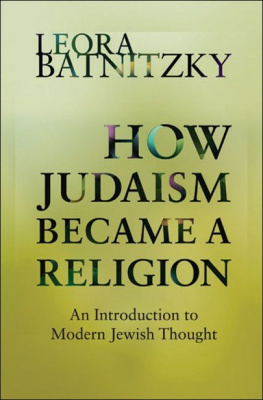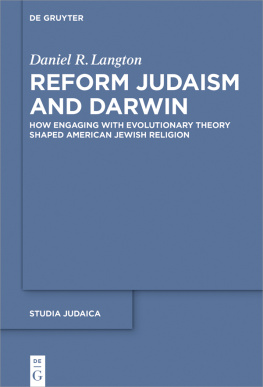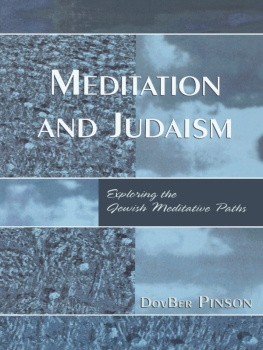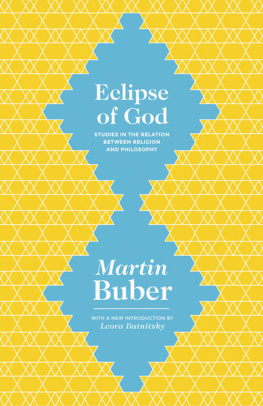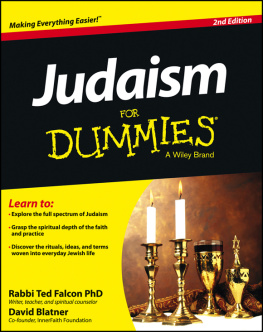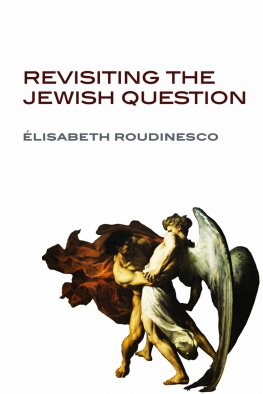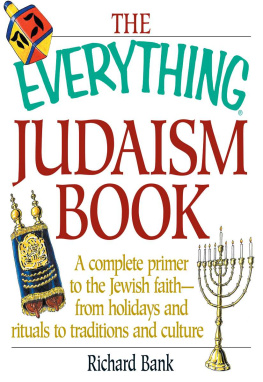How Judaism Became a Religion

How Judaism Became a Religion
AN INTRODUCTION
TO MODERN JEWISH THOUGHT
Leora Batnitzky
PRINCETON UNIVERSITY PRESS
PRINCETON AND OXFORD
Copyright 2011 by Princeton University Press
CPublished by Princeton University Press
41 William Street, Princeton, New Jersey 08540
In the United Kingdom: Princeton University Press
6 Oxford Street, Woodstock, Oxfordshire OX20 1TW
press.princeton.edu
All Rights Reserved
Library of Congress Cataloging-in-Publication Data
Batnitzky, Leora Faye, 1966
How Judaism became a religion : an introduction to modern
Jewish thought / Leora Batnitzky.
p. cm.
Includes bibliographical references and index.
ISBN 978-0-691-13072-9 (hardcover : alk. paper) 1. Judaism
HistoryPhilosophy. I. Title.
BM157.B38 2011
296.09dc22 2011012703
British Library Cataloging-in-Publication Data is available
This book has been composed in Sabon
Printed on acid-free paper.
Printed in the United States of America
1 3 5 7 9 10 8 6 4 2
To Jonathan, Gabriel, and Eli

Ben Zoma said: Who is wise? One who learns from everyone.
Mishnah Avot 4:1
It is better to know some of the questions than all of the answers.
James Thurber
CONTENTS

Judaism as Religion
Modern Judaism and the Invention of Jewish Religion
Religion as History: Religious Reform and the Invention of Modern Orthodoxy
Religion as Reason and the Separation of Religion from Politics
Religion as Experience: The German Jewish Renaissance
Jewish Religion after the Holocaust
Detaching Judaism from Religion
The Irrelevance of Religion and the Emergence of the Jewish Individual
The Transformation of Tradition and the Invention of Jewish Culture
The Rejection of Jewish Religion and the Birth of Jewish Nationalism
Jewish Religion in the United States
ACKNOWLEDGMENTS

This book grew out of an undergraduate course that I have taught for the last decade at Princeton University called Jewish Thought and Modern Society (REL 242). First and foremost, I am grateful to the students who have taken the course over the years for thinking about the question that animates this book: Is Judaism a religion? Three other occasions went a long way in helping me to conceive and write this book: an invitation about twelve years ago from Mark Larrimore to give a lecture on Moses Mendelssohn in his course Approaches to the Study of Religion, a Sophomore Initiative Grant in 2004 from Princeton that allowed me to rework REL 242 around the question of whether Judaism is or is not a religion, and a long series of conversations with Olga Litvak about how to include eastern European thinkers in REL 242. Early discussions with Michele Rosenthal and Diane Winston about this project were also a great boon.
Allan Arkush, Yaacob Dweck, Martin Kavka, Alan Mittleman, Sam Moyn, David Novak, Eli Sacks, Ken Seeskin, and Jeff Stout each offered extensive comments on (and in Allans case, corrections to) the manuscript at various stages. I am enormously grateful for their intellectual generosity. I would like especially to thank Eli Sacks for producing the annotated suggested reading lists following each chapter. Thanks are also due to Jessica Fechtor for her suggestions for readings for , and to Alyssa Quint for her helpful comments on chapters 6 and 7. All of these colleagues have greatly enriched this project. All errors, of course, remain my own.
On both an institutional and human level, I continue to feel fortunate to be a part of the Department of Religion at Princeton. I would like particularly to thank my colleagues Eric Gregory, Martha Himmelfarb, Peter Schfer, Jeff Stout, and Cornel West for helping me think about many of the issues and figures discussed in this book, even if at times they did not know they were doing so. The manuscript also benefited at various stages from Gabriella Wertmans editorial and technical assistance as well as Michele Alperins editing of the penultimate manuscript. Thanks are also due to Lorraine Fuhrmann, Pat Bogdziewicz, Baru Saul, and Kerry Smith for their continued assistance on all matters.
At Princeton University Press, Fred Appel guided this project along with patience and good advice. Id also like to thank Nathan Carr and Diana Goovaerts for their help in the publication process as well as Cindy Milstein for her careful copyediting of the final manuscript.
My family has been a constant source of support and (happy) distraction. I thank my husband, Bob, for his enthusiasm and advice about this project. While I was writing this book, our sons, Jonathan, Gabriel, and Eli, were mostly good sports when I told them, perhaps a few too many times, that I needed just a couple more minutes. I appreciate their patience and even more so I hope that someday they will be interested in the issues in this book. I dedicate the book to them.
How Judaism Became a Religion

INTRODUCTION

Is Judaism a religion? Is Jewishness a matter of culture? Are the Jews a nation? These are modern questions, and this book tries to explain why this is the case. More specifically, this book tells the story of how and why the idea that Judaism is a religion was invented in the modern period, and the many conceptual tensions that followed from it.
Like the notion of Jewish religion, the modern concept of religion more generally is not a neutral or timeless category but instead a modern, European creation, and a Protestant one at that. The etymology of the term religion remains disputed, with some arguing that it comes from the Latin to bind, while others contend the root word is to reread, and still others to be careful. As the distinguished scholar of religion Jonathan Z. Smith notes, the word religion was used in its Roman and early Christian settings as a noun (religio), an adjective (religiosus), and also an adverb (religiose), and all of these uses were related to the performance of ritual practices. In the sixteenth century, colonialists began to use the term specifically with reference to non-Christian ritual practices. Yet by the eighteenth century, religion did not refer mainly to ritual practice or performance but instead to personal belief or faith.
From the eighteenth century onward, modern Jewish thinkers have been concerned with the question of whether or not Judaism can fit into a modern, Protestant category of religion. After all, Judaism has historically been a religion of law and hence practice. Adherence to religious law, which is at least partially, if not largely, public in nature, does not seem to fit into the category of faith or belief, which by definition is individual and private. It is the clash between the modern category of religion and Judaism that gives rise to many of the creative tensions in modern Jewish thought as well as to the question of whether Judaism and Jewishness are matters of religion, culture, or nationality. As we will see, internal Jewish disagreements about the category of religion mirror internal Jewish debates about not only theological and philosophical matters but also about, for instance, modern Yiddish literature and Jewish nationalism. At the same time, we will see that the story of the invention of Jewish religion anticipates many current debates about the nature of contemporary society, such as the separation of church and state, the nature of modern views of tolerance and pluralism, and questions about religions place in the public square.
Next page
